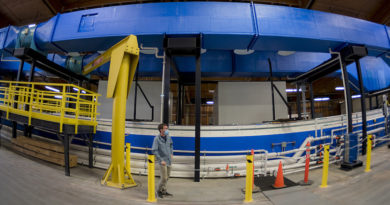Daily Business Report-April 10, 2015
The San Vicente Dam, which was recently raised to increase water storage in the San Diego area. (Photo/San Diego County Water Authority)
Water Authority Said Proposed
Water Reductions Not Equitable
Draft water conservation targets from the State of California call for cuts of 20 to 35 percent in the San Diego area, a range the county water authority labeled as not equitable on Thursday.
The San Diego County Water Authority said the Water Resources Control Board’s proposed water-reduction targets punish those who have conserved and invested in new supplies and reward those who have not.
Proposed cuts range from 20 percent in San Diego and Vista to 35 percent in Carlsbad and Fallbrook. There is a separate target for each local water agency.
“The Water Authority strongly supports additional conservation and the governor’s goals are laudable — but they haven’t been translated yet into proposed regulations that are equitable, protect our economy or advance sensible long-term water policies,” said Mark Weston, chair of the authority’s board.
Weston was in Sacramento on Wednesday to share his concerns with the governor and other state officials.
Potable water use in San Diego County was 12 percent lower in 2014 than it was in 1990 despite an increase of more than 700,000 residents.
The state board is expected to take final action on its proposal May 5 or 6, and its regulations are expected to take effect June 1.
— Times of San Diego
Historic Pinkerton Agency
Opens Office in San Diego
Pinkerton, the risk management agency that traces its history to 1850, when it was launched as Pinkerton’s National Detective Agency, has opened its first office in San Diego. The new branch, which will be the agency’s fourth location in California, is located at 1550 Hotel Circle North.
Operations Manager Val Jimenez, who joined Pinkerton in February, oversees day-to-day responsibilities of the San Diego location as well as company operations throughout Southern California.
Jimenez, a graduate of the FBI’s National Academy, began his career as a deputy sheriff for Kem County, where he subsequently transferred to the California Department of Justice, serving as a special agent. His career with the Department of Justice spanned more than 25 years, with previous assignments including field training officer, unit commander of the foreign prosecution unit, task force officer with the DEA, USMS, Customs Service and Statewide Special Events Operational Commander. Most recently, Jimenez served as the special agent in charge for the San Diego Regional Office.
According to agency history, Pinkerton’s agents served as Abraham Lincoln’s personal security detail during the Civil War, and, at one time, employed more agents than there were members of the standing army of the United States. Pinkerton pioneered new practices in risk management that included creating the forerunner to the U.S. Secret Service, developing the first criminal database and employing the country’s first female detective, Kate Warne.
East County Officials to Celebrate
Half Percent Tax Rollback in El Cajon
East County city and civic leaders will stage a “Rollback Tax Event” on Wednesday, April 15, to celebrate the city of El Cajon’s rollback of the special half percent sales tax.
This month, El Cajon became the only city in California to rollback its sales tax in 2015, which was reduced from 9 percent to 8.5 percent. By comparison, 43 other cities and counties across the state elected to renew or increase their sales tax.
The celebratory event will be held at 11 a.m. at the northeast corner of Parkway Plaza shopping center. Sponsors include the East County Chamber of Commerce, city of El Cajon, Parkway Plaza and the Valley of Cars.
The East County Chamber of Commerce will illustrate the $8.6 million dollar savings to El Cajon residents and visitors with a display from the Valley of Cars, merchandise from Parkway Plaza and an oversized check presentation to a representative of El Cajon residents.
Mesa College Student Named
2015 New Century Scholar

For the second year in a row, a San Diego Mesa College student has been named the top community college student in California. Sarah Taha, 26, a Phi Theta Kappa (PTK) honors student at Mesa College and a resident of La Mesa, is California’s 2015 New Century Scholar.
This is the second year that a Mesa College student has taken top honors. Last year, Sarah Farmer, now a psychology major at UCLA, was named California’s 2014 New Century Scholar.
Taha bested nearly 100 students named to the All-California first, second and third teams to take the New Century Scholar title, which comes with a $2,000 scholarship. The awards were based on scores nominees received from the Phi Theta Kappa judges at the national level. The national application yielded $100,000 in scholarships to 50 community college scholars across the U.S.
Taha says she will use the scholarship money to continue furthering her education and fulfilling her dream of becoming a social entrepreneur.
Taha and fellow Mesa College student Judith Jaime were among 30 students on the first academic team representing 24 California community colleges. Colin Skinner of San Diego Miramar College was one of 31 additional students named to the second team, and City College’s Mauricio Marquez Palencia was one of 31 in the third team.
Blackstone Property Partners
To Acquire Excel Trust Inc.
Excel Trust Inc., a San Diego real estate investment trust, announced that it has agreed to be acquired by Blackstone Property Partners LP for $15.85 per share in an all-cash transaction valued at $2 billion.
The transaction has been unanimously approved by Excel Trust’s Board of Directors and represents a premium of nearly 15 percent over the company’s closing stock price on April 9, 2015, the company said. In addition to the common stock dividend of $0.18 per share payable on April 15, 2015, Excel Trust intends to pay an additional common stock dividend in July 2015, but, under the terms of the agreement, not for any quarter thereafter.
“We believe this is an excellent outcome for our stockholders,” said Gary Sabin, chairman and CEO of Excel Trust. “Appetite for high-quality retail real estate is strong with cap rates and REIT stock multiples approaching historic levels and we did not believe the market accurately reflected the value of the assets. This led the board to conclude it was time to more fully assess the value of our portfolio. After reviewing our options, we were pleased to have a group with Blackstone’s reputation step forward with this offer.”
Brain Scan Explains Why Some Autistic
Kids Don’t Acquire Language Skills
A brain scan given to toddlers who are on the autism spectrum can predict the child’s future language development, researchers at the UC San Diego School of Medicine reported Thursday.
A study published in the online edition of the journal Neuron shows a strong relationship between irregularities in speech activation of the temporal cortex area of the brain and actual language ability in toddlers with autism spectrum disorder.
“We wanted to see if patterns of brain activity in response to language can explain and predict how well language skills would develop in a toddler with ASD before that toddler actually began talking,” said Eric Courchesne, a professor of neurosciences and co-director of the Autism Center of Excellence at UCSD.
Autism presents difficulties for scientists because it presents itself in a variety of ways, and can be hard to detect in very young children.
Courchesne said language is a prime example.
“Some individuals are minimally verbal throughout life. They display high levels of symptom severity and may have poor clinical outcomes,” Courchene said. “Others display delayed early language development, but then progressively acquire language skills and have relatively more positive clinical outcomes.”
Karen Pierce, associate professor of neurosciences and co-director of the Autism Center of Excellence, said it’s important to develop more and new biological ways to identify and “stratify” the ASD population into clinical sub-types so the patients can receive better, more individualized treatments.
The researchers used a functional magnetic resonance imaging device to measure the neural systems’ response to speech in 1- and 2-year-old toddlers, and compared them with assessments of the same children’s language skills two years later.
— Times of San Diego



